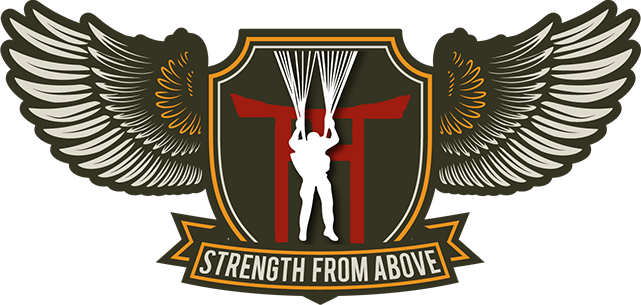CPT Walker, Lee Edwin "Chappie"
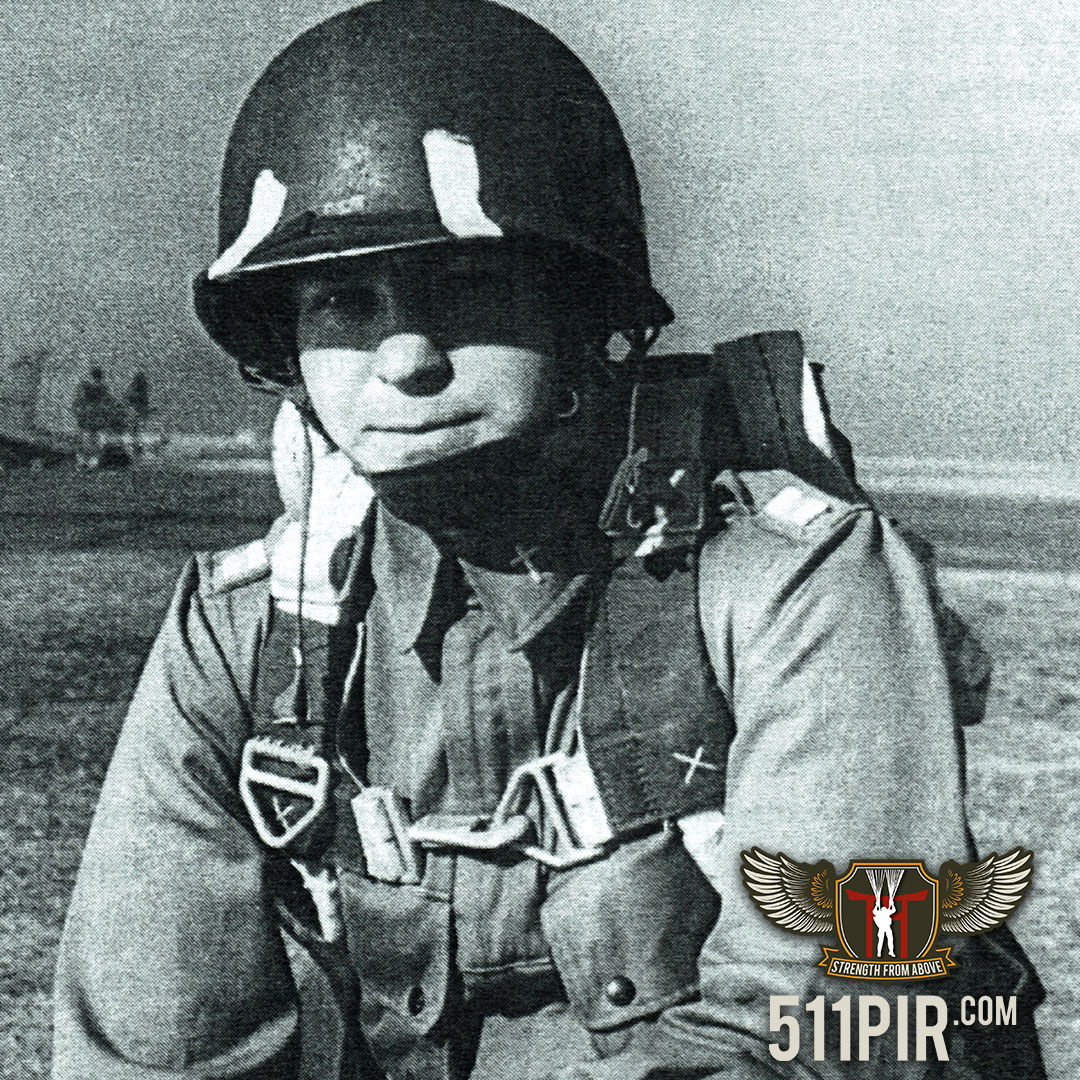
Regimental Chaplain, 511th PIR
July 10, 1911 - April 18, 1997 (Age 85) - gravesite
Citations: Bronze Star; Purple Heart; American Defense Service Medal; American Campaign Medal; Asiatic Pacific Campaign Medal; World War II Victory Medal; Army Occupation Medal (Japan); Philippine Liberation Ribbon.
Bio:
Captain / Doctor Lee Edwin “Chappie” Walker was born on 10 Jul 1911 in Gentry, Arkansas to parents John Rankin and Minnie Wishart Walker.
Chappie graduated from Muskingum College and Xenia Theological Seminary. While at Muskingum he met Ruth E. Shively who taught high school at Batesville High School while Lee attended Xenia Theological Seminary from which he graduated on May 12, 1938.
Lee and Ruth were married two days later on May 14, after which Reverend Walker began his career as a pastor in Somonauk, Illinois at the United Presbyterian church on May 22. Two years later, on October 16, 1940, believing that war was on the horizon and wanting to serve his fellowmen should war break out, Reverend Walker registered with his local draft board at the Dekalb County Court House. Chappie continued ministering until he enlisted, reporting for duty on May 13, 1942, at Pennsylvania’s Indiantown Gap Military Reservation. He was so beloved by his Somonauk congregation that they held a collection to help the new 1st Lieutenant pay for any necessary financial needs.
Chaplain Walker was then sent to Fort Belvoir, Virginia where he labored to serve both the soldiers of the and the local churches he taught and ministered to, performing weddings, baptisms and funerals as needed.
Walker then volunteered for parachute duty and on December 12, 1942, as a newly promoted captain was assigned to the yet-to-be-activated 11th Airborne Division. While awaiting assignment to Parachute School, Captain Walker served as chaplain of the Division Artillery.
Upon graduating Jump School, the 5’5” chaplain returned to Camp Mackall, North Carolina where he was assigned to the newly formed 511th Parachute Infantry Regiment under Colonel Orin D. “Hard Rock” Haugen with which he served through the Luzon campaign.
Chaplain Walker was one of America’s first chaplains to earn their Jump Wings and one of the first ten to ever qualify as Jump Master (and learned quickly that Colonel Haugen never permitted a mustache on his Troopers).
Colonel Haugen made Sunday church attendance mandatory at Camp Mackall, North Carolina and Chaplain Walker gave countless sermons to the young men of the 511th PIR, as well as to local church congregations he was asked to speak at.
In addition, Chappie performed several weddings for the Angels and their brides and labored to lift their spirits during holiday services and in private counseling when they faced problems at home or in the service.
While at Mackall, during a training jump for the 457th Parachute Field Artillery Battalion Chappie Walker became tangled in the static line of LT Fuerstman who was jumpmaster for the jump but exited the plane incorrectly. Luckily, 1LT John S. Conable was able to free the chaplain who landed safely, albeit several miles from the rest of the stick.
In April of 1944, Chief of Army Chaplains MG William R. Arnold sent Captain Walker’s home congregation in Somonauk a certificate honoring Chaplain Walker for his service to the Army.
When the 11th Airborne Division sailed for New Guinea in May of 1944, Chaplain Walker continued holding Sunday services for the 511th PIR on the deck of the SS Sea Pike. The voyage was an unpleasant experience for the Angels and Chappie later wrote, “I could name several who in days gone by would have helped put (the Sea Pike) in more lurid places than Davy Jones’ Locker! S.S. Sea Pike, wherever you are, may you rest and rust in shame and ignominy.”
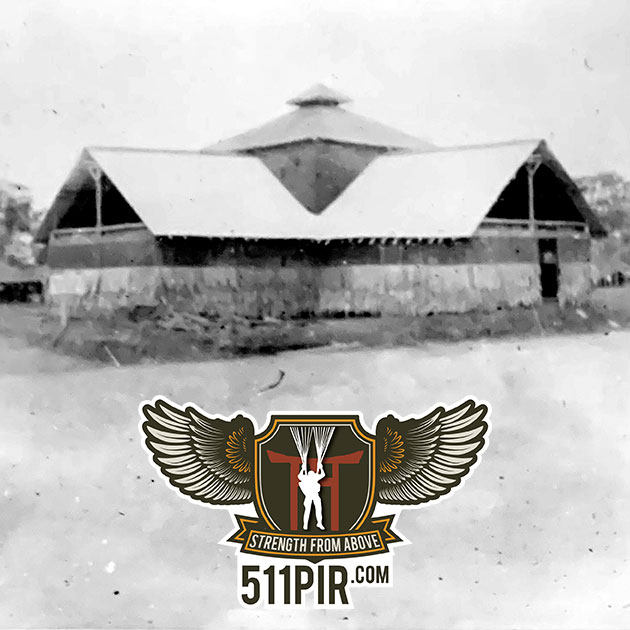 While on New Guinea, Chaplain Walker continued to help the Angels with their personal struggles and holding Sunday and holiday services. He also helped with the construction of the Division’s iconic chapel, built by local Papuans without the use of a single nail.
While on New Guinea, Chaplain Walker continued to help the Angels with their personal struggles and holding Sunday and holiday services. He also helped with the construction of the Division’s iconic chapel, built by local Papuans without the use of a single nail.
When the Angels were first committed to combat on Leyte in November of 1944, Chaplain Walker went with them. And while he carried his Bible for strength, Chappie also carried a .32, a .38 and a .45, leading him to be, to paraphrase several 511th PIR Paratroopers, “The most heavily armed chaplain in the Pacific”.
Nearly three weeks into the Division’s bloody campaign to push across the waistline of Leyte through the mountains, Chappie Walker wanted to go visit the front and do what he could for “his boys” in the 511th PIR. Division commander Major General Joseph May Swing found out and told Walker, “The Chaplain doesn’t have to go there.”
Lee replied, “That’s where the Chaplain is needed.”
Chappie wrote:
“We all knew that when the time came we would do what we had willingly volunteered to do: strap on our parachutes and our fighting gear, climb into the belly of the planes, fasten our seat belts, and head out for the drop zone to do our utmost to perform together the mission to which we had been assigned, regardless of the personal consequences, and without any thought of turning back.”
He added, “We know now that this sense of hope, along with our God-given faith, was the surest key we had to any personal sanity.”
After making a static line jump from a Piper Cub, Chaplain Walker spent days visiting with the battered and weary Paratroopers, giving encouragement through his words, selfless acts, and simple kindness in “the green hell” of Leyte’s jungles, especially his visits to the wounded in their “hospitals” at Mahonag and Manawarat.
He endured the same horrendous conditions and dangers, all while consoling the young Paratroopers as they recovered from wounds or buried their friends and buddies in the mud at Mahonag (photo right). Chappie frequently shared his faith and convictions that the fallen Angels were being received by their God.
Angels who were present at such simple graveside services remember that Chappie always quoted William Shakespeare, saying, “the Coward dies a thousand times, but the valiant dies but once.”
After Chaplain Walker performed such a funeral service for HQ1-511’s PFC Donald Vanker on December 14, 1944, mortarman T/5 Stanley Young said, “The fact that he cared enough to do this made me feel a little better…. Losing guys in combat and our miserable situation hadn’t changed, but I felt much better.”
Chappie later wrote of the men he served with, “‘Angels’: that is what people called them. ‘Heroes’: that will always be their epitaph.”
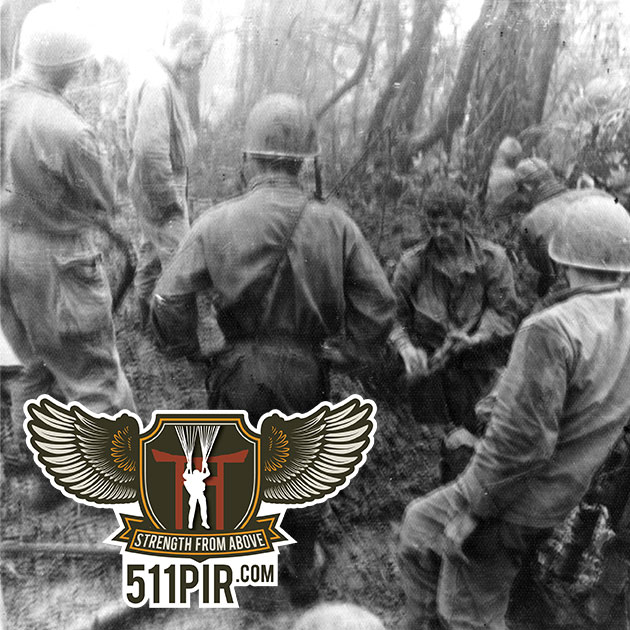 When some HQ-511 troopers were tasked with digging a grave for a fallen comrade, Chappie noticed that the men were struggling due to the physical energy required and the emotional loss. Chappie took turns with their shovels so they could rest and would often share his meager rations or a rare piece of chocolate to lift their spirits and strengthen their weakened bodies.
When some HQ-511 troopers were tasked with digging a grave for a fallen comrade, Chappie noticed that the men were struggling due to the physical energy required and the emotional loss. Chappie took turns with their shovels so they could rest and would often share his meager rations or a rare piece of chocolate to lift their spirits and strengthen their weakened bodies.
In later December of 1945, the 511th’s Paratroopers were starving since there were serious problems with resupply. Chappie Walker went on a short “tour” of the 511th’s positions and after giving a sermon declared, “Now men, we are ready to ask for supernatural help from God. Let us all pray.”
As Chappie prayed, the filthy, hungry, bloodied and sick Angels knelt in the same mud they had been living, fighting and dying in for nearly a month.
After the “foxhole church service”, the young men of the 511th PIR looked up at the overcast sky as the never-ending rain clouds finally parted for a few minutes to reveal a beautiful blue tropical horizon. The hungry Angels cheered when a single C-47 flew overhead to drop badly needed supplies and rations.
In the eyes of the 511th PIR, God had heard the Angels’ prayers and many in the 511th agreed that “Chappie Walker’s Miracle” met all the requirements for sainthood, and it is easy to see why Walker was so loved by the Angels.
Jane Carrico, wife to D-511’s 1LT Andrew Carrico, attended several 11th Airborne Division Association and 511th Parachute Infantry Regiment Association reunions. She said, “They all loved him. I was able to meet (Chaplain Walker) and see the total affection they heaped on him. He was surely the soldier’s Pope.”
For his actions on Leyte, Chaplain Walker was awarded the Bronze Star. After the 511th PIR came down from the hills on Christmas Day of 1944, Chappie sat down to write compassionate letters home to the families of the Angels who lost their lives during the Leyte campaign.
On February 3, 1945, Chappie Walker jumped with the 511th PIR onto Tagaytay Ridge 30 miles south of Manila. He remained close to the frontlines through the campaign to retake the city.
During the Division’s campaign to clear the Malepunyo Mountain Range in April of 1945 on southern Luzon, Chappie Walker made the daily trek up to the heights with the local Filipino ammo carriers and their Angel escorts.
One day, Chappie Walker and 1/511’s LTC Henry Burgess along with a rifleman started their journey back down the mountainside, alone, on was had been declared a “secure trail.” A few miles later, the trio had to hide as between 40-50 enemy soldiers appeared by a stream to fill their canteens. As they tensely waited, Burgess heard a “click” and looked over to see Chaplain Walker holding his snub-nosed .38, ready for use. A “Fighting Preacher”, indeed.
After being wounded on Luzon, Chappie Walker was promoted to Division Chaplain. It was in this role that he was privy to briefings that reviewed the plans for the Invasion of Japan and the 11th Airborne Division’s role in it. Chappie wrote, “In one day I learned more than I ever wanted to know about (the invasion).…It would have been HELL, spelled in capital letters.” After Japan indicated their desire to surrender, Chaplain Walker flew with the 11th Airborne to first Okinawa and then Japan, making him one of the first, if not the first chaplain to land on Japan at the war’s end. Chappie was there with the Division for the Surrender Ceremony onboard the USS Missouri and spent three months in Occupation Duty.
Captain Walker was discharged on points in November of 1945 and returned home to his family. He went on to earn an honorary Doctor of Divinity degree from Monmouth College and an honorary Doctor of Laws degree from Tarkio College.
He worked for 25 years as national church executive, serving as national director of youth work, editor of the Christian Herald Union, associate editor of The United Presbyterian, secretary for higher education and consultant for United Presbyterian Colleges, general secretary of the National Board of Christian Education, general secretary of the United Presbyterian Church of North America, and associate general secretary of the board of Christian education for the United Presbyterian Church, USA.
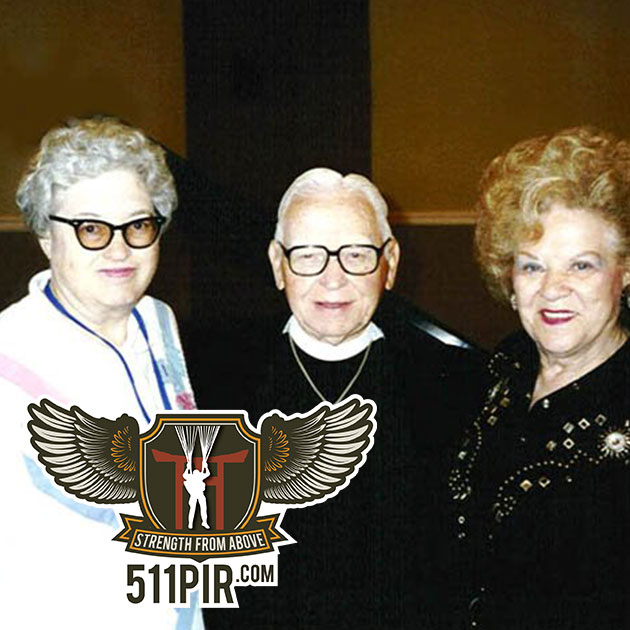 Dr. Walker ministered at the St. Andrew and St. Philip Presbyterian Church (Philadelphia, PA), the First Presbyterian Church (Lancaster, PA), the First Presbyterian Church (Sun City, AZ), Camelback United Presbyterian Church (Scottsdale, AZ), and Westminster Presbyterian Church (Phoenix, AZ).
Dr. Walker ministered at the St. Andrew and St. Philip Presbyterian Church (Philadelphia, PA), the First Presbyterian Church (Lancaster, PA), the First Presbyterian Church (Sun City, AZ), Camelback United Presbyterian Church (Scottsdale, AZ), and Westminster Presbyterian Church (Phoenix, AZ).
Walker was a published author and continued to write articles and editorials for The United Presbyterian, The Link, The Chaplain, Wings Aloft, Voice of the Angels, and Airborne Quarterly. He was a member of the Philadelphia Presbytery, a life member of the 11th Airborne Division Association, the Phoenix Arizona chapter of the 11th Airborne Division Association and the 511th Parachute Association.
For nearly five decades after the war’s end, Chappie Walker continued to serve the Angels of the 11th Airborne Division through letters, attending reunions, phone calls and participating in weddings, baptism and funerals as his time and circumstances allowed.
He noted in his later years, “We salute them for the heroes they were and for the heroes they will always be, as long as there are those of us who still walk in the joy of freedom with loving hearts and remembering minds!”
Dr. Lee Edwin Walker died on Friday, April 18, 1997, at age 85. He was survived by his wife Elizabeth Ann Koelsch Walker (his first wife Rush passed away on April 23, 1967), and his son Dr. J. Calvin Walker, his daughter, Marcia W. Morgan, and five grandchildren.
To learn more about Chappie Walker's 11th Airborne Division in World War II, please consider purchasing a copy of our books on the Angels:
